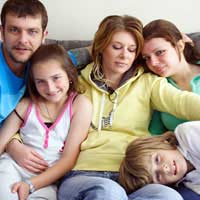Family Therapy for Alcohol Issues Family Life

The route through alcoholism can be complicated. One branch of treatment is family therapy, which looks at the emotional life of an entire family, rather than focusing exclusively on an individual who has been identified as ‘the alcoholic’ – this is because many therapists believe that alcoholism is a family disease and that while one person may be labelled as ‘the problem’, the family dynamic may cause different members to take on different roles that give the whole family some kind of satisfaction.
What Does Family Therapy Do?
Family therapy may be offered in a group setting or as one family working with a single therapist. In either case, the usual approach is to try and change the family's pattern of relationships to stop perpetuating the problem or problems that have led to alcoholism.As an example, decompensation is a family trait: it’s the result of a process that was formally stable becoming unstable. This could lead to psychiatric illness in other family members, or even the alcoholic being ‘encouraged’ to drink again so that the family members can reassume their familiar roles. This could be by somebody bringing alcohol into the home and leaving it where the alcoholic will find it, or simply by taking the alcoholic to places where alcohol is available. Identifying such pathology and trying to change those behaviours is a key feature of family therapy.
Who Can Benefit?
Many alcoholics benefit from family therapy but there are large numbers of alcoholics who either don’t have contact with their families or who have run through the tolerance of their family members who therefore refused to be involved in yet one more potentially failing process.On the other hand, when appropriate, family therapy is deeply effective treatment system. It has three main benefits:
- Motivating the alcoholic to continue to attend for treatment
- Allowing them to focus on the value and benefit of family relationships
- Helping them avoid old behaviour patterns that can lead to a lapse into drinking.
History Of Alcoholism And Family Therapy
Back in the 1930s and 1940s the alcoholic was treated in isolation, because their ‘disease’ was seen as a shameful and frightening one.By the 1960s there was an unhelpful development that suggested the spouses of alcoholics (who were almost always seen as wives, rather than husbands) were complicit in the problem and had ‘chosen’ a husband who drank because they were masochists.
In the 1970s and 1980s, a less judgemental attitude was being developed, which looked at the relationships in the family and explored how to improve it, without making a scapegoat of any family member.
Today treatment includes awareness that alcoholism runs through generations and that many people have been affected by the impact of alcoholism long before they, or their family members, pick up their first drink.
AA And Family Therapy
A large percentage of the family therapy on offer today is based in part on the tenets of Alcoholics Anonymous, Al-Anon and Alateen. However, these groups do not have any position on the value or role of family therapy because AA, Al-Anon and Alateen have no opinions on outside issues and do not endorse, finance, or lend the AA name to any related facility or outside enterprise, lest problems of money, property, and prestige divert AA members from their primary aim, of staying sober.What Defines A Family?
Many therapists define family very loosely to include lovers, close friends, roommates and even colleagues in a professional environment (who may act as surrogate siblings).- Genetics Versus Upbringing in Alcohol Abuse
- Does Family History Influence Choice of Relationships?
- How to Cope With a Recovering Alcoholic
- Codependency: How Families Enable Alcoholics to Function
- Teenage Alcoholism
- Alcohol and Liver Cirrhosis
- How Much Alcohol is Too Much?
- Pretending When You Have a Drink Problem
- The Problem of Teenage Drinking and Alcoholism
- Living With an Alcoholic
- How does Alcoholism Affect Children?


Re: How Can I Talk to my Partner When he is Drunk?
Thank you BarbraL for recommending a guide by Ellen Petersen and sharing the link. I was completely…
Re: The Sale of Alcohol, Who Can Buy It, When and Where
My fiancé is an alcoholic, I have tried numerous times to prevent shops from selling her alcohol…
Re: How Can I Talk to my Partner When he is Drunk?
When dealing with any person who uses too much alcohol, understand that this person will hurt you and the…
Re: How Can I Talk to my Partner When he is Drunk?
When dealing with any person who uses too much alcohol, understand that this person will hurt you and the…
Re: How Can I Talk to my Partner When he is Drunk?
When dealing with any person who uses too much alcohol, understand that this person will hurt you and the…
Re: How Can I Talk to my Partner When he is Drunk?
When dealing with any person who uses too much alcohol, understand that this person will hurt you and the…
Re: A Brief History of Alcohol
What are your sources of information of this? I'm trying to write an essay but have no references for this information.
Re: The Sale of Alcohol, Who Can Buy It, When and Where
I feel utter despair. My son 52 has suffered with mental health for many years and 6 years ago…
Re: How Can I Talk to my Partner When he is Drunk?
I always imagined an alcoholic as a hammered guy, who piss his pants and get drunk every day. But my…
Re: How Can I Talk to my Partner When he is Drunk?
Hi. My partner has a drink problem. We argue about it all the time. I have wanted to kick him out but i…